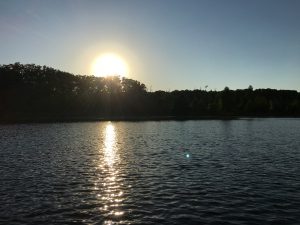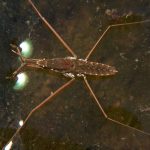
Things we wonder about . . .
I live in Pinckney, and we keep a boat on the Chain of Lakes there. We love everything about it from the serenity of some of the less-traveled spots, to the camaraderie found within the local boating crowd. And we also find ourselves musing on, for lack of a better description, natural history trivia. I took some time to write down the more pressing inquiries and thought “I am going to find an expert and get some answers!’
So, of course, the first thing I did was walk into the next office to chat with our very own Dr. Paul Steen, one of our two watershed ecologists on staff. The Question: What are the creepy spider things that scurry around after we uncover the boat?
 The Answer: “They are water striders. Common in rivers, streams and ponds.” Also, bugs are not creepy to aquatic entomologists. AND “It’s not a spider, it’s an insect,” Dr. Steen nicely corrects me.
The Answer: “They are water striders. Common in rivers, streams and ponds.” Also, bugs are not creepy to aquatic entomologists. AND “It’s not a spider, it’s an insect,” Dr. Steen nicely corrects me.
My next question was based on something that almost actually happened last summer. We were anchored on Little Portage Lake and an osprey flew low over the boat, with a fish in its talons. The load was clearly either larger than expected, or unbalanced, because the flight – and the grip – appeared to be extremely unsteady. The Question: If an osprey drops a fish in my boat, can I keep it? The Answer: I had to contact the DNR for this one. “In order to possess the fish all laws would still apply, so the person would need a fishing license, it would need to be the open season for that fish, the fish would need to be of legal length, and if the person was fishing for that fish they would need to include it in their daily catch. If any of these do not apply they would need to immediately toss it back in the water. And the question comes up “well what if it is already dead?” Again, I would say throw it back. I’m guessing the osprey will come back and grab it after the boat gets out of the area, otherwise it will feed other fish/crayfish/etc.” And I was looking forward to serving pan-fried fish with puncture wounds…
Horseflies are one of the more awful boating companions, and I wanted to know why they have such a nasty bite. The Question: Why are horseflies always around water, and why is their bite so nasty? Dr. Steen had to turn to the internet for this one. The Answer: They lay their eggs near water. And only the females bite, because they need blood for egg development. The bite is nasty because they have huge mandibles with jagged edges. And yes, the pictures are gruesome.
For my swan questions, I went to Dea Armstrong, former ornithologist for the City of Ann Arbor and an active member of HRWC. The Question: We see large swan families at the beginning of every summer, but sometimes the cygnet numbers go from five to one in a short amount of time. What’s going on? The Answer: “Predators or just unable to feed itself has always been my guess. Very few hatch year birds of any species make it past the first year.” Predators can range from eagles, foxes and raccoons, to turtles and even fish.
We also are amused at the cygnets hitching rides. The Question: Why do cygnets ride on the back of mom or dad? The Answer: “Cygnets can swim right away, but spend time riding on their parents’ backs probably (like loons and mergansers) to rest, conserve heat, and avoid predators such as large fish, snapping turtles, gulls and eagles.”
Speaking of snapping turtles, a common question when floating around on noodles or inner tubes with a group of friends is about snapping turtle hazards. Specifically, the possibility of turtles going after any dangly bits. The Question: If I am floating in the lake, minding my own business, will snapping turtles bite my toes? The Answer: “Is there beer involved in that conversation?” asks Dr. Steen. The rest of his answer is hardly reassuring. “Well, they are like sharks – it’s extremely rare, but they can mistake toes for fish or other prey. But they’re just looking for food, not targeting humans.” Well, I sure feel better now.
Join HRWC for Huron River Appreciation Day, Sunday July 10! Come along on a guided trip of the Huron River Water Trail in Dexter, paddle the Lower Huron from Flat Rock or paddle to Milford from Proud Lake, hear a talk on paddling safety and get a free life jacket, hear a river history talk or learn to fly fish!
 Huron River Appreciation Day is sponsored by TOYOTA.
Huron River Appreciation Day is sponsored by TOYOTA.



